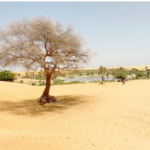As the African Climate Summit gets underway in Nairobi, Kenya, on Monday, more than 500 African civil society organizations have issued seven tough requests to their governments and developed nations.
According to the civil societies, the African people are calling for justice, the decolonization of the economic systems on the continent, and the settlement of climate debt.
Hardi Yakubu of Africans Rising said in a speech on behalf of the Real Africa People’s Climate Summit that Africans were sick of leaders and governments giving the continent endless lip service regarding the effects of climate change on its people.
He said the civil societies demand decolonization of Africa’s economy and development agenda, a repayment of climate debt, the transfer of desperately needed funds to Africa for climate adaptation, losses, and damages, as well as actual answers to “this gripping issue the continent faces.”
- 8.3m persons in need of humanitarian interventions in Northeast – FG
- Why the world needs more oil, not less
Due to systemic energy and water shortages, crippling poverty, and a lack of access to renewable energy, between 600 and 900 million people are being forced to flee their homes and leave their countries.
Africa is the most impacted by climate change despite contributing less than 4% to it, as floods, droughts, and other associated crises continue to devastate the continent disproportionately while wealthy nations, which are the biggest polluters, have not kept their commitments to reduce pollution.
In a move that will draw attention to the hardship of more than 900 million people in the continent, they are also calling for an end to energy capture, an urgent halt to fossil fuel projects, and the rejection of false solutions.
The seven issues highlighted in their request to African governments and wealthy nations are decolonization of the continent’s economy and development, repayment of climate debt and delivery of funds, no false solutions, building global solidarity, peace and justice, no new fossil fuels, new commitments for international cooperation, ending energy agency capture, and energy system capture across Africa.
Statistics show that Africa has been thrust into a never-ending cycle of poverty, hunger, undue exposure to climate-induced disasters, and ever-dwindling investment in adaptation and mitigation measures due to climate change.
According to Lorraine Chiponda of the Africa Movements Building Space, the fact that Africans continue to bear an unfair share of the severe effects of climate change is a serious indictment on global authorities and businesses.
“Non-African led solutions to tackle climate change halfway through the implementation of sustainable development goals (SDGs) – and 10 years since the launch of Africa’s development blueprint – Agenda 2063 – have sparked major concerns among climate stakeholders on the continent.
“Further, climate-induced disasters are increasing both the cost of borrowing and exacerbating the risk of debt crises. Most countries have no option other than borrowing to deal with the recovery and reconstruction costs whenever disasters hit.”
Joab Okanda of Christian Aid warned that there was no escape from the harsh fact that climate change is tearing Africa apart and that the true answers rest with communities on the frontlines of the climate catastrophe.

 Join Daily Trust WhatsApp Community For Quick Access To News and Happenings Around You.
Join Daily Trust WhatsApp Community For Quick Access To News and Happenings Around You.


